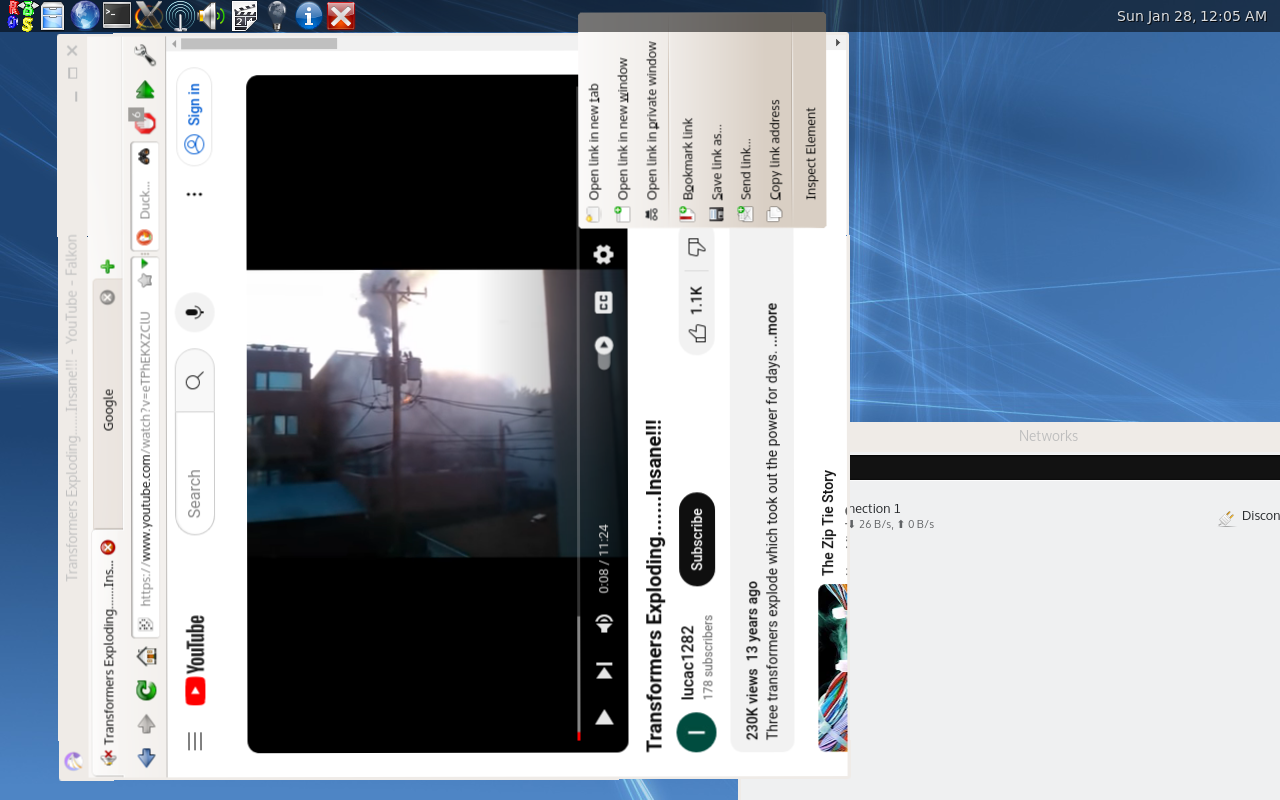Rebecca Black OS.
It is the only Linux distro to date built around Weston, using Wayland’s full capability:

It doesn’t include any Rebecca Black theming or is related to her in any way.
It’s just called that cause the dev is a fan of hers.From the name, I expected a Hannah Montana Linux type distro.
Tell me if has a special “Friday” desktop at least.
I’m pretty sure that screenshot is Wayfire, not Weston.
right. This is Weston (same distro):

Oh jeez. I forgot about that. I had that running on my DS back in the day from a GBA flashcart with a big-ass CompactFlash card sticking out the bottom. Good times.
Wow, I just realized it was the first Linux I ever used
Yes, particularly the variant distributed on a business-card sized CD rom. To be carried in your wallet for emergency use.
Hannah Monata Linux and Red Star from North Korea.
Woah woah woah, there’s a North Korean Linux distribution?
Yes, of course. They can hardly use an OS that phones home to the US.
It’s interesting because it’s essentially the opposite of the idea behind Linux. Using Linux specifically to censor and spy on people is diabolical, but it makes sense why they chose it.
The idea behind Linux is to create an operating system anyone can use in any way they want.
That includes the North Korean government using it to spy on their people.Sounds more like a BSD kind of idea, to be honest. The GNU idea is to let specifically end-users have control over their own computer, not some third-party.
A meme Linux is the “most obscure” you can think of?
Actually the Red Star developers seem very serious
The first one that came to mind was fli4l (Floppy ISDN for Linux). Originally a distro of German origin that fit on a single floppy disk to turn a 386 or 486 PC into a router for ISDN connections. Last I looked it’s still actively worked on.
There are probably tons of more obsuce ones. But this is one I actually used.
I’ve recently gone through my dad’s floppies and found one with fli4l.
Check out the random button on Distrowatch (distrowatch.com/random.php) - it’s like a Linux lottery, but you always win something weird!
Let’s make this a game. Click on it, then you have to install that on bare metal and daily it for a month.
Got RISC OS
mom, I’m scared
Oh god, I got Murena (LineageOS distro). How does one install that onto a ThinkPad T480…
What are you currently using?
On that ThinkPad, LMDE.
I got Plamo Linux
I got portuex, never used Slackware but seems serviceable, I’m just scared of nVidia driver setup haha
Ha I got tuxedo OS, hopefully thats not too niche
That’s what I’ve been running on my gaming machine and it’s been great.
That’s nice to hear!
Got PakOS, but since I’m not Pakistani I’m not sure how useful it would be
Rockstor here. Which is interesting bc I’ve been thinking about setting up another NAS.
I got Linux Lite, which I’ve tried in the past.
I got archcraft.
Lucky me. It’s also from India which is fun.
https://distrowatch.com/table-mobile.php?distribution=archcraft
Gentoo. Not that bad for a random pick.
deleted by creator
This distro’s default background isn’t a knockoff of any particular popular non-*nix proprietary operating system’s default background:

Smoothwall. I used to run it a lot back in the early 2000s for personal use and even helped set up a couple small businesses with it but I don’t hear of anyone else using it these days, people seem to love openwrt and pfsense more.
It was great for just taking any old x86 machine and making a powerful, fully featured firewall/router out of it, including a VPN server, all through a web interface. Nowadays that’s boring shit but in 2002 it was pretty cool.
Good old Smoothie. Served me well back then. I think it went commercial at some point.
We had this as the firewall in our school! I remember bypassing it in so many ways with Google DNS and whatnot.
Any reason to use this over opnsense?
elive
you think a distribution that automatically includes all the proprietary stuff that we use baked into the distro would be more popular since it makes linux ready to go for most people; but it still gets fewer than 300 clicks per month.
automatically includes all the proprietary stuff
Jail.
They’ve been able to figure it out so far
Doesn’t Pop!OS do that already?
And Ubuntu, no? Wasn’t that the big selling point of Ubuntu back in the day?
Yes, as far as they’re allowed to in this country
I feel like the Enlightenment desktop environment isn’t to everyone’s taste. It’s definitely got some idiosyncratic design choices…
Its unpopularity may be related to that it asks money or a positive review in a blog to even try. Used to be so a few years ago.
i wasn’t aware that it had changed like that; i stopped using it when i switch to linux laptops from linux companies like tuxedo and system76
First I’m hearing of it. I’ma try it out
It made me lazy since they got everything to work out of the box. Lol
This. People always go “It looks like MacOS” but to me esp the icons just look like outdated Linux Mint/Cinnamon from 15 years ago. If people like ot that’s cool, it’s just not for me.
hyperbola
they have a wiki with insane nonsens about why they don’t package certain things. Example:
pam
Package has different security-issues and is not oriented on the way of technical emancipation as Hyperbola is trying to adapt lightweight implementations.https://wiki.hyperbola.info/doku.php?id=en%3Aphilosophy%3Aincompatible_packages
Wait… they’re militant enough about Free Software to refuse to package anything even slightly non-Free, but their “final goal” is to switch the kernel to BSD (i.e. away from copyleft)? WTF?
but their “final goal” is to switch the kernel to BSD (i.e. away from copyleft)?
HyperbolaBSD is a hard fork, that relicenses the OpenBSD kernel as GPL (as permitted by permissive licenses.) HyperbolaBSD has already dug into the OpenBSD source tree and discovered numerous licensing issues. https://git.hyperbola.info:50100/~team/documentation/todo.git/tree/openbsd_kernel-file-list-with-license-issues.md
HyperbolaBSD will be a truly libre distro that takes advantage of copyleft, while moving away from the major issues Linux is stepping into too.
Ah, that’s different then!
Hmm…
From https://wiki.hyperbola.info/doku.php?id=en%3Amanual%3Acontrib%3Ahyperbolabsd_faq:
HyperbolaBSD is under a progressive migration by replacing all non GPL-compatible code. It will be replaced with new compatible code under Simplified BSD License. We do this in order to incorporate GPL code from other projects such as ReactOS, as well new code from scratch.
It’s not clear to me that relicensing the existing code to GPL is what they’re planning on doing; it sounds more like they’re going to mix in GPL code but not change the existing files to GPL en masse after they finish harmonizing them to two-clause BSD.
Frankly, IMO that’s too bad: I’d love to see them make the whole shebang GPLv3-or-later
Related question: is all Linux kernel code required to be licensed GPLv2-only, or are individual contributions allowed to be GPLv2-or-later? I’d be nice to see if that project (and stuff like HURD and ReactOS) could benefit from at least some Linux contributions, even if they can’t copy it wholesale.
afaik Linus is against GPLv3 in his Linux project https://www.youtube.com/watch?v=PaKIZ7gJlRU
It’s an ancient divide in parts of the FOSS community that believes copyleft licenses are not “free” because they force you to license contributions under the same license.
Yeah, I know, but I would’ve expected a distro that describes itself as “GNU/Linux-libre” would fall on the other side of it!
No one thinks this. Even permissively licensed BSD operating systems package GPL software and accept it as Free Software.
Wow, you weren’t kidding.
Why did I read all of this.
was that translated into english from another language?
I love how they blended FAQ with meth-induced psychosis rambling.
I’ve gotta give them kudos for sticking to their very strict values, but holy hell is this hard to parse
Certain things? Fucking luddite idiots don’t package 99.9% of software.
AIX Unix from the 1980s is literally more useful than that heap of garbage
Why so much rage?
Yes, Hyperbola is very ideological and super strict, but it was always meant to be that way - to provide a system that works in some way and at the same time is as ethical and “clean” as possible. Some people value it over anything, and for them, Hyperbola is a good pick.
it’s main feature is that it completely redefines the system’s root directory structure. the only reason i even know it exists is because i’m friends with one of the creators
Gobo Linux has to have been the distro I was looking forward to most too. I really hope it picks up because it’s design philosophies. Absolutely phenomenal.
I hear you saying “not compatible with FHS” but then extra words I no longer need to hear.
Meego, a combination of Intel’s Moblin and Nokia’s Maemo. It only ever shipped on one device, the Nokia N9.
I much enjoyed it back in the day. Nokia even had their own app store for it and gave a nice financial incentive for the first hundred or thousand apps.
I feel Jolla & SailfishOS is the spiritual successor.
Have you ever heard of arch? That’s what I use by the way
Hardly obscure.
KISS
it’s just a single bash script and a repository containing package definitions to compile them from source.
Basically LFS on drugs.
Interesting, was searching for anybody who mentioned LFS/Linux From Scratch leading here. Doesn’t seem active anymore though.
Suicide linux. Nobody can run it for more than a day
Edit: i just searched “suicide linux” to see if it still exists and one of the top results was ian murdock’s wiki page, :(
“suicide linux”
Looked it up with quotes and the first update in the first search result:
Update 2011-12-26
Someone has turned Suicide Linux into a genuine Debian package. Good show!
:(
Rarely hear about DSL anymore, http://www.damnsmalllinux.org/
It was dead for a long time, was replaced in spirit by Puppy Linux, and only recently was reactivated.
That was my go-to long ago
most obscure and to me coolest but unfortunately not very active https://sourcemage.org/
I remember reading about it like 10 years ago along with LunarLinux (e: and sorcerer) as was curious about other source based linux distros. I thought both were dead, glad that at least sourcemage is still alive
its always a bit hard to tell with source distros.
i was gonna say source mage! so i guess it’s not that obscure, if two of us thought to mention it.
I think its obscure but some wierdos geek out on it :)













